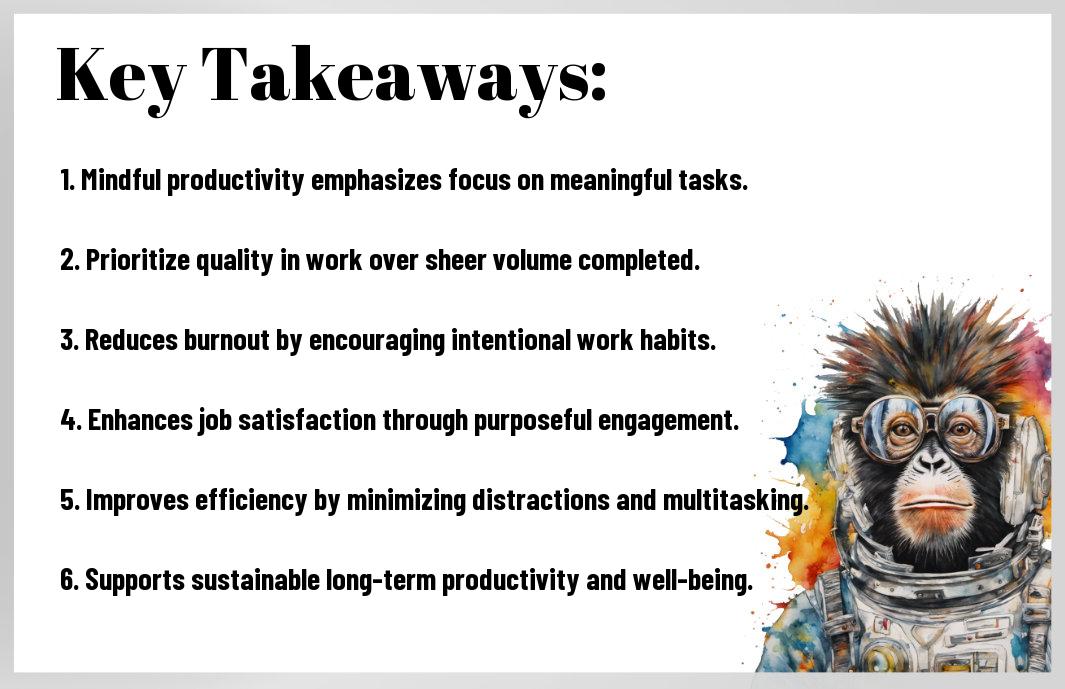There’s a growing recognition that working smarter often yields better results than simply working harder. In your quest for productivity, it’s crucial to shift your focus from a quantity-driven approach to one that prioritizes quality. By embracing mindful productivity, you can enhance your performance and achieve more meaningful outcomes with less stress. This blog post will guide you through effective strategies to cultivate a work environment that fosters creativity and sustainable success, ultimately helping you to harness the true potential of your efforts.

Key Takeaways:
- Prioritize tasks by focusing on quality outcomes rather than merely increasing the amount of work done.
- Incorporate mindfulness practices to enhance concentration and reduce stress, leading to more effective productivity.
- Encourage a balanced approach to work that promotes well-being, thus fostering sustained motivation and creativity.
Understanding Mindful Productivity
Before you begin on a journey of mindful productivity, it’s vital to grasp what it truly entails. Mindful productivity goes beyond mere task completion; it invites you to engage fully in your work while remaining aware of your thoughts and feelings. This approach encourages a balance between achieving goals and maintaining mental clarity, leading to a more fulfilling work experience.
Definition of Mindful Productivity
Above all, mindful productivity is a practice that blends focus and awareness in your professional life. It emphasizes quality over quantity, urging you to prioritize intentionality in your tasks rather than racing against the clock. This concept encourages you to manage your time effectively while also fostering a deeper connection with your work.
Benefits of Mindfulness in Work
At its core, incorporating mindfulness in your work can lead to enhanced concentration and reduced stress levels. By cultivating awareness, you can make more thoughtful decisions and avoid burnout, thus increasing your overall efficiency. You’ll likely find that this balanced approach not only improves your productivity but also enhances your job satisfaction.
Considering the fast-paced nature of modern work environments, embracing mindfulness is more important than ever. By practicing mindfulness, you can mitigate work-related stress, which has been linked to decreased productivity and increased absenteeism. Moreover, you may experience heightened creativity and engagement, as your mind becomes clearer and more focused. Ultimately, bringing mindfulness into your work life will yield lasting benefits, enhancing not only the quality of your output but also your emotional well-being.

Quality Over Quantity
There’s a growing recognition in today’s fast-paced work environment that productivity isn’t just about getting more done; it’s about delivering value. Prioritizing quality over quantity enables you to focus on the impact of your work, fostering deeper engagement and satisfaction. When you emphasize quality, you’re not only producing better outcomes but also enhancing your own skills and expertise. This shift allows you to create meaningful contributions that resonate with your goals and those of your organization.
The Importance of Prioritizing Quality
Beside boosting your personal effectiveness, prioritizing quality invites a culture of excellence in your workplace. When you focus on high standards, you inspire others to follow suit, ultimately elevating the overall performance of your team. High-quality work leads to greater client satisfaction and strengthens relationships, benefiting both you and your organization in the long run.
Strategies for Enhancing Work Quality
An effective way to enhance the quality of your work is by adopting structured strategies that foster focus and creativity. By breaking your projects into manageable parts and setting clear goals, you can allocate your energy where it matters most. Utilize feedback loops with peers to gain fresh insights, making iterative adjustments that refine your outcomes. Additionally, practicing time management techniques, such as the Pomodoro Technique, can help you concentrate and sustain high quality.
Importance of prioritizing strategies for enhancing work quality cannot be overstated. By focusing on a few impactful tasks, you conserve your energy and creativity, enabling you to deliver superior results. Engaging with your colleagues for constructive feedback fosters a collaborative atmosphere that ensures you’re on the right track. Furthermore, establishing a routine with dedicated focus time can significantly improve the quality of your output. By implementing these strategies, you turn daily efforts into remarkable achievements that showcase your commitment to excellence.
Techniques for Mindful Work
Unlike traditional productivity methods that prioritize speed and output, mindful work techniques focus on enhancing your overall well-being and effectiveness. By integrating mindfulness into your daily routines, you can cultivate a deeper awareness of your thoughts and emotions, leading to improved focus and decision-making. Techniques such as deep breathing, mindful breaks, and intentional journaling help create a balanced work experience that values quality over sheer volume.
Mindfulness Practices for Enhanced Focus
One effective way to enhance your focus is through mindfulness meditation. Setting aside just a few minutes each day for meditation helps you develop a greater awareness of your thoughts, reducing distractions and fostering a calm state of mind. Incorporating simple practices like guided meditation, body scans, or even mindful walking can sharpen your concentration, enabling you to engage deeply with your tasks and make more meaningful progress.
Time Management and Mindfulness
Among the key components of effective time management is the incorporation of mindfulness into your scheduling and prioritization processes. By being present and considering your energy levels when planning tasks, you can allocate your time more wisely, minimizing stress and maximizing your output.
At the core of effective time management and mindfulness lies the importance of self-awareness. By regularly assessing your energy levels and work styles, you can align your most important tasks with your peak productivity moments. This approach enables you to reduce overwhelm and focus on what truly matters, allowing your effort to be directed towards tasks that promote quality results. Emphasizing mindfulness during your work hours can also help you set realistic goals, creating a sense of balance that fosters both fulfillment and success.
Creating a Supportive Work Environment
After establishing a focus on mindful productivity, the next step is to create a supportive work environment. This involves carefully curating a space that nurtures well-being and encourages open communication. You can foster collaboration among team members, incorporate areas for relaxation, and ensure that the work environment represents a balance of comfort and productivity. Emphasizing mental health not only enhances job satisfaction but also promotes a culture where individuals feel valued and engaged in their roles.
Fostering a Mindful Culture
Below are several strategies to foster a mindful culture within your organization. Start by encouraging practices such as meditation, regular breaks, and flexibility in work hours. Engage your team in discussions about mindfulness and its positive effects on productivity. Providing resources and opportunities for team bonding can significantly enhance overall morale, transforming your workplace into a haven where everyone supports one another.
Tools and Resources for Mindful Productivity
The right tools and resources can significantly enhance your journey towards mindful productivity. By integrating apps for meditation, time tracking, and focus-enhancing techniques, you can streamline your work process while also prioritizing well-being. Explore platforms that promote task management without overwhelming you, ensuring that you maintain a balance between efficiency and mindfulness.
Creating a workspace equipped with effective tools and resources is important for maintaining mindful productivity. Utilize apps that support meditation and mindfulness techniques, which can help you recharge and stay focused throughout the day. Choose task management software that prioritizes your well-being, allowing you to accomplish more without feeling rushed. By integrating regular breaks into your schedule, you can ensure that your productivity quality remains high, leading to a healthier, more fulfilling work experience.
Measuring Success in Mindful Productivity
Not all productivity can be measured by traditional metrics like hours worked or tasks completed. Instead, success in mindful productivity focuses on your ability to achieve meaningful outcomes while maintaining a balanced approach to work. By emphasizing quality of work, mental well-being, and sustainable practices, you can redefine what success looks like in your professional life. This shift in perspective encourages you to prioritize your overall satisfaction and effectiveness over a mere tally of accomplishments.
Metrics for Quality Assessment
By integrating qualitative metrics into your assessment of productivity, you can better focus on the impact of your work. Consider evaluating your tasks based on their alignment with your core values, the depth of engagement they require, and the positive outcomes they produce. This approach helps you measure success not just by the quantity of tasks completed, but also by the richness of your contributions and the fulfillment they bring to your life.
The Role of Feedback and Reflection
Role of feedback and reflection in your mindful productivity journey cannot be overstated. Engaging with constructive feedback enables you to gain insight into your strengths and areas for improvement. Taking time to reflect on your work fosters a deeper understanding of how your efforts align with your values and goals. This ongoing process allows you to adjust your methods and better appreciate your achievements, enhancing your overall effectiveness.
A regular practice of feedback and reflection can significantly impact your productivity journey. When you actively seek constructive criticism from peers, you gain valuable insights that can illuminate your path toward enhanced performance. This engagement fosters a sense of community and helps you identify patterns in your work habits. Moreover, taking the time to reflect allows you to process your experiences, evaluate what worked and what didn’t, and realign your actions with your personal and professional objectives. As a result, you cultivate a more intentional and fulfilling approach to your work.
Overcoming Common Challenges
For many individuals, the journey to mindful productivity can be fraught with obstacles. Distractions, procrastination, and negative self-talk often undermine your efforts, making it hard to focus on what truly matters. Recognizing these challenges is the first step towards overcoming them, paving the way for a more balanced and productive approach to your work.
Identifying Barriers to Mindful Productivity
With a clear understanding of the obstacles you face, you can start identifying the barriers to your mindful productivity. These could be environmental factors, emotional triggers, or even ingrained habits that deter you from maintaining focus. Acknowledging these barriers enables you to create a targeted plan to address and manage them effectively.
Strategies for Maintaining Consistency
With effective strategies in place, you can maintain consistency in your mindful productivity practice. Time management techniques, accountability partners, and routine-building can significantly enhance your ability to stay on track. Consistency requires effort and intention, but the rewards are well worth the persistent focus.
Considering the importance of consistency, establishing a routine aids in reinforcing your commitment to mindful productivity. Creating specific time blocks for your tasks helps you prioritize and eliminate distractions. In addition, finding an accountability partner ensures you remain committed to your goals while providing motivation and constructive feedback. Additionally, make sure to regularly reflect on your progress; this self-assessment nurtures a sense of achievement and keeps you aligned with your mindful productivity objectives.
Conclusion
With this in mind, adopting the principles of WorkWell’s mindful productivity can transform your approach to work by prioritizing quality over quantity. By focusing on meaningful tasks and maintaining a balanced mindset, you can enhance your efficiency while promoting overall well-being. Embrace strategies that foster mindfulness in your daily routine, allowing you to achieve your goals without unnecessary stress. Ultimately, this approach not only improves your productivity but also enriches your professional and personal life.
FAQ
Q: What is the main philosophy behind WorkWell?
A: The core philosophy of WorkWell is to prioritize quality over quantity in productivity. This approach emphasizes the importance of mindful work practices, encouraging individuals to focus on completing fewer tasks with greater attention and care, rather than rushing through a larger number of tasks. By promoting a balanced mindset, WorkWell aims to enhance overall well-being and job satisfaction, leading to improved performance and personal fulfillment.
Q: How does WorkWell support mindful productivity?
A: WorkWell provides a range of tools and resources designed to cultivate mindful productivity. This includes techniques for better time management, stress reduction strategies, and methods to improve concentration and focus. Workshops and online courses are also available, guiding users through practical exercises that help integrate mindfulness into their work routines. Additionally, the platform encourages regular breaks and reflection, allowing individuals to recharge and reassess their priorities throughout the day.
Q: Can WorkWell be beneficial for teams, or is it only for individuals?
A: WorkWell is highly beneficial for both individuals and teams. For teams, the platform fosters a collaborative environment where members can share their mindful productivity experiences and support one another in achieving shared goals. The emphasis on quality encourages team discussions around priorities and teamwork, leading to enhanced communication and synergy. Implementing WorkWell principles in a group setting can result in a more engaged, motivated, and productive workforce, ultimately boosting overall team performance.

Leave a Reply